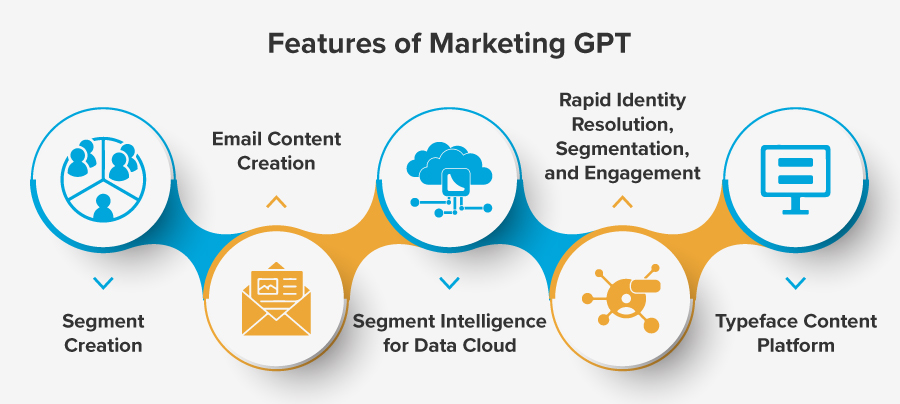AI Redefined: How Salesforce Marketing GPT is Transforming Personalized Marketing
In today’s hyper-competitive business landscape, successful marketing goes beyond traditional strategies.
Personalization has emerged as a game-changing factor, enabling companies to connect with customers on a deeper level and deliver tailored experiences that resonate with their individual preferences and needs.
Businesses that have mastered personalization are reaping a staggering 40% more revenue[i] compared to their peers. Personalization is not just a fleeting trend; it has become a fundamental pillar for sustainable business growth.
That’s where Salesforce Marketing GPT steps in. Before the emergence of this groundbreaking technology, achieving personalization at scale was challenging. Traditional marketing automation tools were limited in their capabilities, often relying on rule-based approaches that fell short in delivering truly personalized experiences.
However, with Marketing GPT that’s powered by the cutting-edge generative AI tools integrated into Salesforce’s product lineup, a new era of personalized marketing has emerged.
In this article, we’ll read everything you need to know about Marketing GPT and how it is poised to revolutionize your marketing efforts.
What is Salesforce Marketing GPT?
At the recent Salesforce Connections event on June 7, 2023, Salesforce announced Marketing GPT – a remarkable milestone in the field of AI in marketing.
According to 60% of marketers, generative AI will transform their role, and 71% say they will be able to focus on their strategic goals with it.[ii]
With Marketing GPT, you can generate content on your own; thanks to generative AI! By personalizing every aspect of the marketing process, Marketing GPT will revolutionize how companies communicate with their customers.
Let’s take a closer look at what Marketing GPT can do so far as outlined by Salesforce during their announcement:

Segment Creation:
This feature offers a better way to build your audience segmentation strategy. Marketing Cloud can create audience segments for you using natural language prompts. It leverages AI recommendations and audience data from Data Cloud to enhance your targeting capabilities.
Email Content Creation:
With this feature, Marketing GPT can auto-generate emails, potentially reducing the writing workload for marketing teams. It aims to assist those who struggle with email marketing but have the necessary content.
Segment Intelligence for Data Cloud:
This feature combines first-party audience data, revenue data, and paid media data to provide insights into campaign performance in relation to audience segments. It enables you to track ROI more effectively.
Rapid Identity Resolution, Segmentation, and Engagement:
This feature ensures that Data Cloud segments are continuously updated in real-time. It allows for relevant and timely messaging, enabling businesses to adapt at the speed of their customers.
Typeface Content Platform:
Salesforce plans to introduce a third-party content generator called Typeface. This platform will enable marketers to create branded visual assets such as email graphics or social cards, within the Salesforce ecosystem. Stay tuned for updates on this potentially significant addition.
These are the features Salesforce highlighted during their announcement. As Salesforce continues to release updates, we can expect the list of Marketing GPT features to expand further. Here are the expected Marketing GPT features and their time of availability:

How to Make Salesforce Marketing GPT Work for You
Understanding Your Goals:
Before implementing Salesforce Marketing GPT, clearly define your marketing goals and objectives. Identify how personalized marketing can help you achieve those goals and align your implementation strategy accordingly.
Data Integration and Quality:
Ensure that your data sources are properly integrated with Salesforce Marketing GPT. Cleanse and organize your data to maintain accuracy and consistency as high-quality data is essential for generating meaningful insights and delivering personalized experiences.
Segmentation Strategy:
Develop a robust segmentation strategy to effectively target and engage different customer segments. Leverage Salesforce Marketing GPT to create dynamic audience segments based on behavior, preferences, and other relevant factors. Continuously refine and update your segments, based on customer interactions and feedback.
Content Creation and Optimization:
Take advantage of Marketing GPT’s content creation capabilities. Experiment with different personalized messaging approaches and monitor their effectiveness. Optimize your content based on data-driven insights to improve engagement and conversion rates.
Compliance and Data Privacy:
Ensure compliance with data protection regulations and respect customer privacy when implementing Marketing GPT. Obtain necessary consent and permissions for data usage and establish robust security measures to safeguard customer information.
Stay Agile and Adaptive:
Keep pace with evolving customer expectations and industry trends as you scale customer engagement. Embrace agility in your marketing strategies and adapt your personalized marketing approach as customer preferences and market dynamics change.
By following these best practices, you can maximize the impact of Salesforce Marketing GPT, deliver personalized experiences, and drive significant business outcomes.
The Bottom Line
Salesforce Marketing GPT is poised to revolutionize the future of AI in marketing, unlocking immense potential in advancing personalization. With increasingly advanced AI algorithms, marketers can harness the power of Marketing GPT to craft hyper-personalized experiences that cater to individual preferences, behaviors, and needs. This unprecedented level of personalization empowers brands to establish deeper connections with customers and deliver highly relevant content seamlessly across multiple touchpoints. The future of marketing is personalized, and Marketing GPT is at the forefront of driving this transformative shift.
Statistics References:
- [i] McKinsey
- [ii] Salesforce
